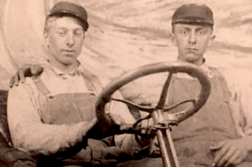THE FOLLOWING WORDS were published anonymously ten years ago in a pamphlet titled “The Gay Gene Will Not Protect You,” by a group of queer activists in New York City under the name Pink Tank: “The question isn’t whether we are gay. It’s whether we are out. We don’t have to figure out why we are queer. It doesn’t matter. History shows that genes will not save you when someone with power wants to keep you down or to eliminate you.”
As a gay teenager in the ’90s and a twenty-something through the ’00s, I experienced the nature-nurture debate that Pink Tank was dismissing as constant background noise to my sexual and political coming of age—particularly in my adopted home state of Maine, where non-discrimination laws for sexual orientation were overturned by referendum repeatedly from the early 90s until their eventual passage in the 2005 election. Now a bit older, perhaps a bit wiser—or at least well trained in the ways of academic scholarship—I’ve found it fascinating to look back on the heyday of the debate between “essentialism” and “social constructionism,” as well as the biological studies that tried to establish the etiology of homosexuality as genetic or biological in origin. I’m particularly interested in the ways in which scientific research is always situated within social, political, and economic frameworks despite the sciences’ historic claims to objectivity and cold truths.






